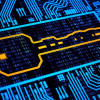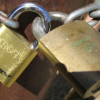Quantum computers still a long ways off.
The Economist has a great article up concerning Quantum computers and the difficulties behind them.
On paper, at least, a quantum computer sounds fantastic. An ordinary digital computer relies on bits—binary digits, each either a zero or a one—to store information. But quantum theory states that subatomic particles can exist in multiple states simultaneously, a phenomenon known as superposition. An electron, for example, has a property known as “spin” that can be “up”, “down”, or a peculiar quantum combination of both at the same time. Using the spin of an electron to represent a bit of data thus allows two possibilities to be represented and manipulated at once. Each additional quantum bit, or “qubit” doubles the number of possible states that can be handled. That leads to an exponential growth in processing power: each operation in a two-qubit quantum computer can handle four possible states at once, and a 20-qubit device could manipulate over a million different states at once.
Make sure you check it out. I'm still waiting to see what Josette (our physicist) has to say about all this. :)









































































